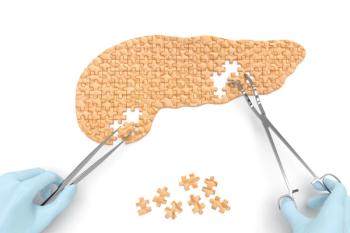
Vitamin D Deficiency Could Increase Chemo-Induced Neuropathy Risk in Patients With Breast Cancer
In a population of 1191 patients with early-stage breast cancer, 20.7% of patients with a vitamin D deficiency experienced grade 3 or higher sensoryCIPN.
Patients with breast cancer who have a vitamin D deficiency prior to receiving paclitaxel treatment are more likely to experience chemotherapy-induced peripheral neuropathy (CIPN), according to data from a biomarker analysis of the phase 3SWOG S0221 study (NCT00070564) that were published in the Journal of the National Comprehensive Cancer Network.1
In a population of 1191 patients with early-stage breast cancer, 20.7% of patients with a vitamin D deficiency experienced grade 3 or higher sensoryCIPN compared with 14.2% of patients with sufficient vitamin D levels (OR, 1.57; 95% CI, 1.14-2.15;P=.005), according to findings from the primary univariate analysis. The association was maintained after adjusting for age and chemotherapy treatment schedule, investigators reported (adjusted OR [aOR], 1.65; 95% CI, 1.18-2.30; P = .003). However, significance was lost after adjusting for self-reported race (aOR, 1.39; 95% CI, 0.98-1.97; P = .066).
Older patients (OR, 1.02; 95% CI, 1.01-1.04; P = .005), those who self-reported as being Black (OR, 2.48; 95% CI, 1.57-3.86; P <.001), those of other races (OR, 1.84; 95% CI, 1.06-3.07; P = .025), and those randomized to receive paclitaxel twice weekly (OR, 2.37; 95% CI, 1.73-3.29; P <.001) had more events of CIPN.
“These results suggest that vitamin D supplementation in patients with lower levels of vitamin D may reduce peripheral neuropathy, and particularly high grade peripheral neuropathy, which would improve these patients’ long-term quality of life,” senior researcher Daniel L. Hertz, PharmD, PhD, University of Michigan College of Pharmacy, said in a press release on the analysis’ findings.2 “There are barely any negative consequences that come from taking steps to increase vitamin D levels. Patients can easily take safe, inexpensive, and widely available over the counter supplements.”
Investigators analyzed data from the randomized phase 3 SWOG S0221 trial in which different chemotherapy dosing schedules were examined in2849 eligible patients with early-stage breast cancer. Of that population, 1620 had a minimum of 2 available serum samples, and 1191 patients were selected for the biomarker analysis.
The results were adjusted based on age, body mass index, and race.Researchers found that vitamin D deficiency was more prevalent in Black patients (77.1%%) than White patients (28.2%; OR, 8.56; 95% CI, 5.44-13.92; P <.001), as well asCIPN incidence (29.4% vs 14.3%, respectively; OR, 2.48; 95% CI, 1.57-3.86;P<.001).
When investigators assessed mechanical hypersensitivity based on vitamin D deficiency in mice, they reported that a vitamin D-deficient diet resulted in neurotoxicity-like symptoms.
CIPN affects up to 70% of patients who receive paclitaxel treatment. Despite this, there are currently no established treatments that prevent or treat CIPN or alleviate its sensory or motor symptoms. Pretreatment of vitamin D is the first validated and potentially modifiable biomarker that may reduce the chances of experiencing CIPN from paclitaxel.
Investigators reported several limitations of the analysis. Firstly, though there was evidence that vitamin D deficiency was more prevalent in Black patients, researchers acknowledged that there was a limited number of non-White participants in the analysis. Larger populations are needed to continue to understand the link between race, vitamin D, and CIPN. Further analysis may come from the phase 2 EAZ171 trial (NCT04001829), which will be examining options to reduce CIPN following docetaxel or paclitaxel in African American patients diagnosed with stage I to III breast cancer.
In addition, because data was received from another study and S0221 did not include patients who experienced grade 2 CIPN or document detailed paclitaxel dosing information, misclassification of CIPN grades could have occurred.
Secondly, though Common Terminology Criteria for Adverse Events (CTCAE) is considered less sensitive for detecting subjective toxicities, researchers chose to use CTCAE data rather than patient-reported outcomes (PROs) as the primary CIPN endpoint because CTCAE was available in all patients in the study. Additionally, there was no data collection of other CIPN risk factors, such as preexisting peripheral neuropathy and existence of diabetes. Therefore, additional trials are needed to determine whether sufficient vitamin D levels prevent CIPN and improve treatment outcomes in patients with breast and other cancer types.
References
1. Chen CS, Zirpoli G, Barlow WE, et al. Vitamin D insufficiency as a risk factor for paclitaxel-induced peripheral neuropathy in SWOG S0221.2023;21(11):1172-1180. doi:10.6004/jnccn.2023.7062
2. New research in JNCCN suggests a simple and inexpensive option for reducing a major chemotherapy side-effect. News release. National Comprehensive Cancer Network.November 7, 2023. Accessed November 8, 2023. https://bit.ly/49stLS0
Newsletter
Pharmacy practice is always changing. Stay ahead of the curve with the Drug Topics newsletter and get the latest drug information, industry trends, and patient care tips.























